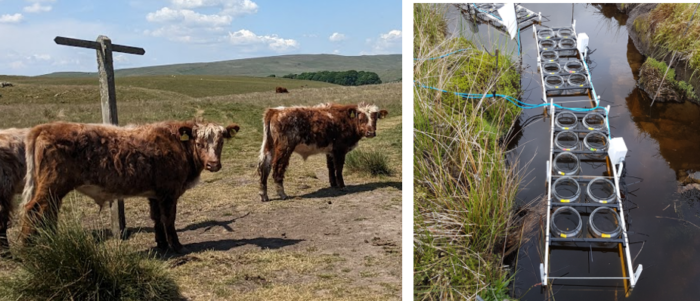QUANTUM
Quantifying the combined nutrient enrichment, pathogenic, and ecotoxicological impacts of livestock farming on UK rivers
Livestock farming is the dominant farming type and source of organic matter pollution in UK freshwaters, with over 9.65m cattle and 32.7m sheep on 10m hectares of grassland, representing 57% of all agricultural land in the UK.
When livestock excreta are flushed to waters it changes its physical, chemical and ecological quality and function. This material contains inorganic nutrient contaminants typically included in routine water quality monitoring programmes across the UK, but also contains many other compounds which are not monitored. These include nutrient-rich organic matter, pathogens, pharmaceuticals and hormones likely to drive significant damage to freshwater ecosystems, and presenting a persistent problem for recreational water use, fisheries and shellfisheries and drinking water abstracted from livestock farming catchments.
Increases in water temperature and alterations in flow regime due to climate change will accelerate the biological processing of this material in freshwaters, while increased frequency of rainfall events predicted for the UK may overwhelm on-farm storage capacity, confounding efforts to reduce livestock farming impacts on UK freshwaters.

QUANTUM will deliver new understanding on how these stressors, environmental characteristics and management efforts interact to drive changes in UK water quality in livestock-dominated catchments by focusing on three themes:
- Theme 1 - Exploring how climate and catchment changes affect the sources and processes by which pollutants from livestock farming, enter, mix, and are transported through and leave river systems.
- Theme 2 - Investigating the impact of the mixtures of chemical and biological contaminants from different types of livestock farming, and their exposure regimes on UK river ecosystems.
- Theme 3 - Enabling and informing the development of better plans for adaptation, mitigation and detection of the risks of livestock farming as a key driver of declining river quality, both now and in the future.
The project has been awarded around £1.6million, to deliver the evidence needed to examine the impact of livestock farming on UK rivers including ecotoxicological, nutrient enrichment and pathogen effects.

The research will look at how this varies depending on the environmental character of the land, responses to mitigation efforts and the impact of climate change. The project aims to support effective, targeted catchment management and protect the quality of UK rivers. QUANTUM will be working with their project partners to deliver 5 work packages that will quantify the impact of livestock on freshwater quality:
- Work Package 1 - Defining the chemical and microbial character of different livestock excreta
- Work Package 2 - Investigating how manure management, environment and instream processing transform the contaminant pool instream.
- Work Package 3 - Tracking the ecotoxicological impacts of livestock excreta in UK rivers.
- Work Package 4 - Determining the nutrient enrichment impacts of livestock excreta on freshwater biota.
- Work Package 5 - Developing pan-UK advice on livestock as a driver of changing quality in UK rivers.
Field sites: the Conwy, Bristol Avon and 50 further catchments across livestock farming regions in Wales, Scotland, Northern Ireland, and the north and west of England.
Led by Professor Penny Johnes, University of Bristol including partners Lancaster University, Exeter University, Bangor University of Bath
Project partners: DEFRA, Natural Resources Wales, Natural England, UK Water Industry Research, Wessex Water, Welsh Water and Harper Adams University
Project website: quantumfreshwaters.org
Twitter: @QuantumFreshwtr
Project News